Dependency parsing (2013)
Download as PPT, PDF3 likes8,279 views
This document discusses dependency parsing and defines several key grammatical terms used in dependency parsing like root, advmod, aux, nsubj, dobj, and prep_for and prep_on. It also provides references for the Stanford Dependency Parser, IBM's English Slot Grammar Parser, and an introductory video about dependency parsing by Christopher Manning.
1 of 10
Downloaded 26 times
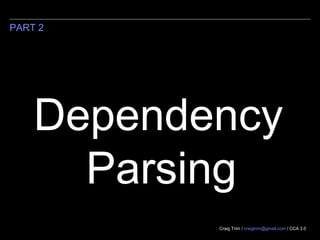

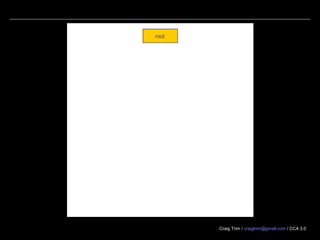
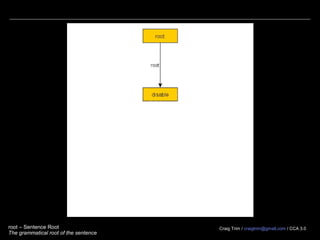
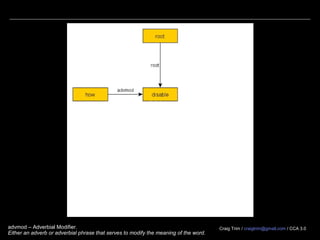
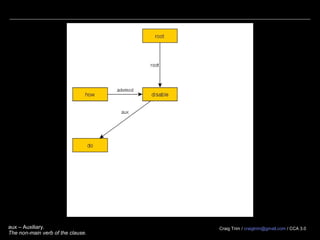
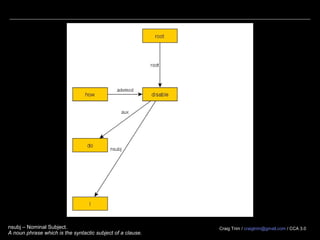
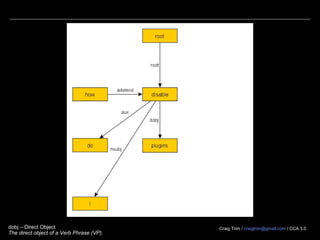
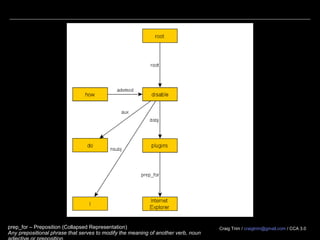
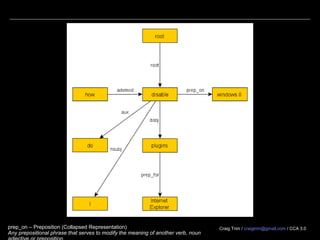
Recommended
Deep Parsing (2012)



Deep Parsing (2012)Craig Trim
╠²
The document discusses deep parsing and the parsing process. It describes parsing a sample sentence by highlighting its structural components, part-of-speech tags, and tokens. It also covers extracting segments, creating a semantic chain, normalizing the chain, and adding additional semantic context. The goal is to compare the semantic chain to the parse tree structure.English Grammar Lecture 13: The Object Complement Patterns



English Grammar Lecture 13: The Object Complement PatternsEd McCorduck
╠²
Video version of "The Object Complement Patterns" lecture I delivered in my English 402--Grammar course at the State University of New York College at Cortland.English Grammar Lecture 6: Verb Patterns and the "Be" Patterns



English Grammar Lecture 6: Verb Patterns and the "Be" PatternsEd McCorduck
╠²
The "Verb Patterns and the 'Be' Patterns" lecture I delivered in my English 402--Grammar course at the State University of New York College at Cortland.English Grammar Lecture 5: Sentences



English Grammar Lecture 5: SentencesEd McCorduck
╠²
This document provides an overview of sentence structure and analysis. It defines a sentence as being made up of two main phrases: a noun phrase and a verb phrase. Each phrase can consist of a single word or multiple words. Sentences can also be analyzed as having two main parts: a subject and a predicate. Reed-Kellogg diagrams are introduced as a way to visually represent sentence structure, showing the relationship between subjects and predicates. Examples are given of simple sentences diagrammed in this way, and how modifiers are added to the diagrams.LOGICAL CONNETIVES USE DISCRETE MATHSMATICS ASSINGMENT



LOGICAL CONNETIVES USE DISCRETE MATHSMATICS ASSINGMENTSELF EMPLOY
╠²
This document discusses logical connectives and their use in natural and formal languages. It defines logical connectives as symbols that connect propositions such that the truth value of the resulting statement depends only on the input propositions and the connective. In natural language, words like 'and' and 'or' can serve as logical connectives, but words like 'so' are not always logical. There are 5 basic logical connectives - negation, conjunction, disjunction, conditional, and biconditional - along with their truth tables and examples. Logical connectives allow for logical reasoning and have applications in computer science.e0206



e0206a1c9e2g8
╠²
The document defines the word "digress" as to stray or deviate from the main topic. It then provides a list of synonyms for digressing, such as aberrate, circumlocute, drift, and ramble. The document concludes with "be direct" and "stay" as listed antonyms for digressing.BoyerŌĆōMoore string search algorithm



BoyerŌĆōMoore string search algorithmHamid Shekarforoush
╠²
The document describes the Boyer-Moore string search algorithm, which improves on the naive string matching algorithm. It uses two rules - the bad character rule and good suffix rule - to skip unnecessary character comparisons, making string searches more efficient. The bad character rule uses a table to determine how far to shift the pattern when a mismatch occurs, while the good suffix rule allows reusing matches when they are found. Together these rules allow Boyer-Moore to significantly outperform the naive algorithm.Text classification presentation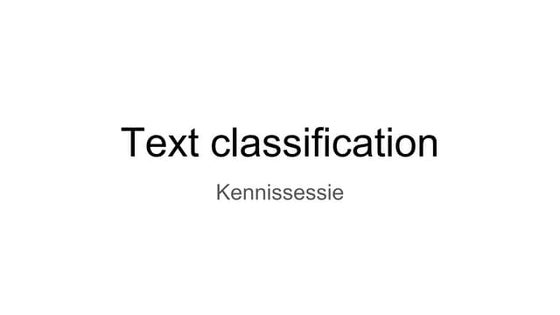



Text classification presentationMarijn van Zelst
╠²
The document discusses text classification and different techniques for performing classification on text data, including dimensionality reduction, text embedding, and classification pipelines. It describes using dimensionality reduction techniques like TSNE to visualize high-dimensional text data in 2D and how this can aid classification. Text embedding techniques like doc2vec are discussed for converting text into fixed-dimensional vectors before classification. Several examples show doc2vec outperforming classification directly on word counts. The document concludes that extracting the right features from data is key and visualization can provide insight into feature quality.Publishing Python to PyPI using Github Actions.pptx



Publishing Python to PyPI using Github Actions.pptxCraig Trim
╠²
This presentation provides a straightforward guide to publishing Python projects on PyPI using GitHub Actions. It's a practical walkthrough for developers on automating the release process of their Python packages. You'll learn how to set up a PyPI token, configure GitHub workflows, and push updates that trigger automatic package deployment. This resource is for anyone looking to eliminate manual uploads to PyPI with a straightforward approach to using GitHub's tools for continuous integration and deployment.Ontologies and the Semantic Web



Ontologies and the Semantic WebCraig Trim
╠²
This document provides an overview of ontologies and the semantic web. It discusses key concepts like triples, ontologies, and methodologies for creating semantic networks. It covers topics such as ontology design, the SPARQL query language, and inferencing. Examples are given around representing information about Shakespeare and his play Hamlet as triples. The document also includes appendices on resources like the Web Ontology Language and common ontology editors and triple stores.SAS Visual Process Flows



SAS Visual Process FlowsCraig Trim
╠²
This document provides instructions for importing CSV files and running basic analyses in SAS University Edition (UE) using a visual palette. It describes how to upload CSV files from a local computer, import them into SAS UE by dragging the files onto the visual palette, clean and rename the imported dataset, and link the imported dataset to a PROC FREQ analysis to view frequencies of key variables. The document notes that the method for selecting the visual palette changed in SAS UE version 3.6 and provides guidance for transferring data out of the SAS UE Toolwire environment.SAS University Edition - Getting Started



SAS University Edition - Getting StartedCraig Trim
╠²
This document provides instructions for setting up and using SAS University Edition on a virtual machine. It outlines downloading and installing VirtualBox, creating a SAS web account, importing and launching the SAS UE virtual appliance in VirtualBox, accessing SAS training modules online, and writing and running SAS code by defining a library and referencing training data files. Troubleshooting tips are included, such as deleting and recreating the virtual machine if errors occur.Bluemix NL Classifier Tutorial



Bluemix NL Classifier TutorialCraig Trim
╠²
The document provides instructions for configuring a question type classifier on IBM Bluemix. It describes 15 common question types, how to prepare question data by formatting it as text-class pairs in a CSV file, and a 5-step process for deploying and training a classifier on Bluemix: 1) Access the service, 2) Add the service, 3) Access the toolkit, 4) Deploy the app, 5) View and use the trained classifier. Optional steps describe renaming the service, adding routes, and Java code for classification.Bluemix - Deploying a Java Web Application



Bluemix - Deploying a Java Web ApplicationCraig Trim
╠²
This document discusses deploying a Java web application to Bluemix using Cloud Foundry. It describes creating a simple JAX-RS web app, configuring a Maven build script and manifest, checking the code into a Git project on Jazz Hub, building and deploying the app through a Jenkins pipeline that runs the Maven and deployment scripts, and testing the deployed URL.IBM Bluemix - Building a Project with Maven



IBM Bluemix - Building a Project with MavenCraig Trim
╠²
This document describes how to use Maven, Jenkins, and Docker to build and deploy Java projects to Bluemix. It explains that Maven is used to specify build procedures, Jenkins can be configured to automatically build projects using Maven when code is committed to Git, and Docker is used to provision transient Jenkins slaves to run builds. However, using transient Docker containers means the Maven repository is also transient, which is problematic as artifacts cannot be shared between builds. The document suggests publishing artifacts to an external Maven repository to overcome this limitation.Question Types in Natural Language Processing



Question Types in Natural Language ProcessingCraig Trim
╠²
The document discusses different types of questions, including knowledge deficit questions, common ground questions to establish shared understanding, and social coordination questions that indirectly request actions. It also covers assumptions behind questions, categories of questions like verification and definition, and dimensions like the information sources and cognitive processes involved in asking and answering questions. Answering questions is challenging as it requires knowledge of the world, tasks, inference, users, language, and discourse pragmatics. Language use depends on cognition and user intent rather than just referring to objects.Jenkins on Docker



Jenkins on DockerCraig Trim
╠²
This document discusses extending the official Jenkins Docker image to include Maven. It describes building a Docker image called "craig/jenkins" that installs Maven, exposes Jenkins on port 8040, and mounts a host directory for configuration. Instructions are provided for configuring Maven and installing the Git plugin in Jenkins. The goal is to have a Dockerized Jenkins setup with Maven and Git support for continuous integration.IBM Bluemix: Creating a Git Project



IBM Bluemix: Creating a Git ProjectCraig Trim
╠²
The document provides instructions for creating a project in Bluemix, syncing it with GitHub, and inviting friends. It explains how to log in to Bluemix and Jazz Hub, create a new private project to store Dockerfiles without deploying the application, view the project overview which resembles a GitHub view, set up Git to commit and pull files, and invite members by clicking on the Members section.Things and strings public



Things and strings publicCraig Trim
╠²
The document compares triple stores and property graphs. Triple stores follow the W3C standard and have stable structure but can have overhead from reification. Property graphs do not have a standard yet but allow flexible things and strings as nodes and edges without reification overhead through coding by convention. While easy to write, query and understand, property graphs are subject to interpretation errors in tracing provenance chains.Octave - Prototyping Machine Learning Algorithms



Octave - Prototyping Machine Learning AlgorithmsCraig Trim
╠²
Octave is a high-level language suitable for prototyping learning algorithms.
Octave is primarily intended for numerical computations and provides extensive graphics capabilities for data visualization and manipulation. Octave is normally used through its interactive command line interface, but it can also be used to write non-interactive programs. The syntax is matrix-based and provides various functions for matrix operations. This tool has been in active development for over 20 years.PROV Overview



PROV OverviewCraig Trim
╠²
This document defines key terms used in the PROV ontology for describing the provenance of entities and activities on the web. It defines agents as things that bear responsibility, entities as physical or conceptual things, and activities as things that occur over time and involve entities. It then defines relationships between these terms, such as an activity being associated with an agent, an entity being generated by an activity, or one activity being informed by another.The Onomyicon

The OnomyiconCraig Trim
╠²
The document defines and provides examples of various types of terms related to names (onomastics), including:
- Acronyms - pronounceable words formed from letter initials of other words.
- Anthroponyms - names of people.
- Toponyms - names of places.
- Ethnonyms - names of ethnic groups.
It discusses sub-categories such as acronyms that have taken on identities as words (anacronyms), names based on a person's father (patronymys), and words that have opposite meanings (antonyms). Over 40 different onomastic terms are defined in the document.Inference using owl 2.0 semantics



Inference using owl 2.0 semanticsCraig Trim
╠²
This document discusses properties in ontology and logical reasoning, including transitive, symmetric, reflexive, and other properties. It provides examples of how different property types allow for certain inferences between related and unrelated nodes. It also discusses part-whole relations and reasoning with multiple hierarchical properties. References are listed on ontology modeling and OWL 2.0 specifications from the W3C.An Introduction to the Jena API



An Introduction to the Jena APICraig Trim
╠²
This document provides an introduction to working with triples and datasets using the Jena API in Java. It discusses how to [1] create a dataset and named model, [2] create resources, properties, and literals that compose a triple, and [3] connect the triple components by adding them to a model. It also briefly covers serializing the model contents to file in different RDF formats like RDF/XML, TTL, and N-Triple. The goal is to demonstrate the basic steps for building, querying, and persisting RDF triples with Jena.The art of tokenization



The art of tokenizationCraig Trim
╠²
The document discusses various aspects of tokenization including:
- Tokenization is the process of segmenting text into words and sentences. It is not as simple as just splitting on whitespace, as multi-word tokens exist.
- Several tokenizers are compared on examples, showing the need for techniques beyond just whitespace to properly tokenize text.
- Considerations for tokenizing punctuation, numbers, contractions and acronyms are discussed. The impact of tokenization on downstream NLP tasks like parsing is also covered. Accurate tokenization requires techniques like morphological analysis and named entity recognition.Ontology and semantic web (2016)



Ontology and semantic web (2016)Craig Trim
╠²
This document provides an outline and overview of ontologies and the semantic web. It discusses triples, ontologies, SPARQL, inferencing, and methodology for creating a semantic network. Triples, reification, confidence levels, ontology design, architecture, and components are covered. Methodology includes building a semantic network from natural language processing.TrustArc Webinar - Building your DPIA/PIA Program: Best Practices & Tips



TrustArc Webinar - Building your DPIA/PIA Program: Best Practices & TipsTrustArc
╠²
Understanding DPIA/PIAs and how to implement them can be the key to embedding privacy in the heart of your organization as well as achieving compliance with multiple data protection / privacy laws, such as GDPR and CCPA. Indeed, the GDPR mandates Privacy by Design and requires documented Data Protection Impact Assessments (DPIAs) for high risk processing and the EU AI Act requires an assessment of fundamental rights.
How can you build this into a sustainable program across your business? What are the similarities and differences between PIAs and DPIAs? What are the best practices for integrating PIAs/DPIAs into your data privacy processes?
Whether you're refining your compliance framework or looking to enhance your PIA/DPIA execution, this session will provide actionable insights and strategies to ensure your organization meets the highest standards of data protection.
Join our panel of privacy experts as we explore:
- DPIA & PIA best practices
- Key regulatory requirements for conducting PIAs and DPIAs
- How to identify and mitigate data privacy risks through comprehensive assessments
- Strategies for ensuring documentation and compliance are robust and defensible
- Real-world case studies that highlight common pitfalls and practical solutionsBackstage Software Templates for Java Developers



Backstage Software Templates for Java DevelopersMarkus Eisele
╠²
As a Java developer you might have a hard time accepting the limitations that you feel being introduced into your development cycles. Let's look at the positives and learn everything important to know to turn Backstag's software templates into a helpful tool you can use to elevate the platform experience for all developers.[Webinar] Scaling Made Simple: Getting Started with No-Code Web Apps![[Webinar] Scaling Made Simple: Getting Started with No-Code Web Apps](https://cdn.slidesharecdn.com/ss_thumbnails/webinarscalingmadesimplegettingstartedwithno-codewebapps-mar52025-250305183437-f03c78a3-thumbnail.jpg?width=560&fit=bounds)
![[Webinar] Scaling Made Simple: Getting Started with No-Code Web Apps](https://cdn.slidesharecdn.com/ss_thumbnails/webinarscalingmadesimplegettingstartedwithno-codewebapps-mar52025-250305183437-f03c78a3-thumbnail.jpg?width=560&fit=bounds)
![[Webinar] Scaling Made Simple: Getting Started with No-Code Web Apps](https://cdn.slidesharecdn.com/ss_thumbnails/webinarscalingmadesimplegettingstartedwithno-codewebapps-mar52025-250305183437-f03c78a3-thumbnail.jpg?width=560&fit=bounds)
![[Webinar] Scaling Made Simple: Getting Started with No-Code Web Apps](https://cdn.slidesharecdn.com/ss_thumbnails/webinarscalingmadesimplegettingstartedwithno-codewebapps-mar52025-250305183437-f03c78a3-thumbnail.jpg?width=560&fit=bounds)
[Webinar] Scaling Made Simple: Getting Started with No-Code Web AppsSafe Software
╠²
Ready to simplify workflow sharing across your organization without diving into complex coding? With FME Flow Apps, you can build no-code web apps that make your data work harder for you ŌĆö fast.
In this webinar, weŌĆÖll show you how to:
Build and deploy Workspace Apps to create an intuitive user interface for self-serve data processing and validation.
Automate processes using Automation Apps. Learn to create a no-code web app to kick off workflows tailored to your needs, trigger multiple workspaces and external actions, and use conditional filtering within automations to control your workflows.
Create a centralized portal with Gallery Apps to share a collection of no-code web apps across your organization.
Through real-world examples and practical demos, youŌĆÖll learn how to transform your workflows into intuitive, self-serve solutions that empower your team and save you time. We canŌĆÖt wait to show you whatŌĆÖs possible!THE BIG TEN BIOPHARMACEUTICAL MNCs: GLOBAL CAPABILITY CENTERS IN INDIA



THE BIG TEN BIOPHARMACEUTICAL MNCs: GLOBAL CAPABILITY CENTERS IN INDIASrivaanchi Nathan
╠²
This business intelligence report, "The Big Ten Biopharmaceutical MNCs: Global Capability Centers in India", provides an in-depth analysis of the operations and contributions of the Global Capability Centers (GCCs) of ten leading biopharmaceutical multinational corporations in India. The report covers AstraZeneca, Bayer, Bristol Myers Squibb, GlaxoSmithKline (GSK), Novartis, Sanofi, Roche, Pfizer, Novo Nordisk, and Eli Lilly. In this report each company's GCC is profiled with details on location, workforce size, investment, and the strategic roles these centers play in global business operations, research and development, and information technology and digital innovation.More Related Content
More from Craig Trim (18)
Publishing Python to PyPI using Github Actions.pptx



Publishing Python to PyPI using Github Actions.pptxCraig Trim
╠²
This presentation provides a straightforward guide to publishing Python projects on PyPI using GitHub Actions. It's a practical walkthrough for developers on automating the release process of their Python packages. You'll learn how to set up a PyPI token, configure GitHub workflows, and push updates that trigger automatic package deployment. This resource is for anyone looking to eliminate manual uploads to PyPI with a straightforward approach to using GitHub's tools for continuous integration and deployment.Ontologies and the Semantic Web



Ontologies and the Semantic WebCraig Trim
╠²
This document provides an overview of ontologies and the semantic web. It discusses key concepts like triples, ontologies, and methodologies for creating semantic networks. It covers topics such as ontology design, the SPARQL query language, and inferencing. Examples are given around representing information about Shakespeare and his play Hamlet as triples. The document also includes appendices on resources like the Web Ontology Language and common ontology editors and triple stores.SAS Visual Process Flows



SAS Visual Process FlowsCraig Trim
╠²
This document provides instructions for importing CSV files and running basic analyses in SAS University Edition (UE) using a visual palette. It describes how to upload CSV files from a local computer, import them into SAS UE by dragging the files onto the visual palette, clean and rename the imported dataset, and link the imported dataset to a PROC FREQ analysis to view frequencies of key variables. The document notes that the method for selecting the visual palette changed in SAS UE version 3.6 and provides guidance for transferring data out of the SAS UE Toolwire environment.SAS University Edition - Getting Started



SAS University Edition - Getting StartedCraig Trim
╠²
This document provides instructions for setting up and using SAS University Edition on a virtual machine. It outlines downloading and installing VirtualBox, creating a SAS web account, importing and launching the SAS UE virtual appliance in VirtualBox, accessing SAS training modules online, and writing and running SAS code by defining a library and referencing training data files. Troubleshooting tips are included, such as deleting and recreating the virtual machine if errors occur.Bluemix NL Classifier Tutorial



Bluemix NL Classifier TutorialCraig Trim
╠²
The document provides instructions for configuring a question type classifier on IBM Bluemix. It describes 15 common question types, how to prepare question data by formatting it as text-class pairs in a CSV file, and a 5-step process for deploying and training a classifier on Bluemix: 1) Access the service, 2) Add the service, 3) Access the toolkit, 4) Deploy the app, 5) View and use the trained classifier. Optional steps describe renaming the service, adding routes, and Java code for classification.Bluemix - Deploying a Java Web Application



Bluemix - Deploying a Java Web ApplicationCraig Trim
╠²
This document discusses deploying a Java web application to Bluemix using Cloud Foundry. It describes creating a simple JAX-RS web app, configuring a Maven build script and manifest, checking the code into a Git project on Jazz Hub, building and deploying the app through a Jenkins pipeline that runs the Maven and deployment scripts, and testing the deployed URL.IBM Bluemix - Building a Project with Maven



IBM Bluemix - Building a Project with MavenCraig Trim
╠²
This document describes how to use Maven, Jenkins, and Docker to build and deploy Java projects to Bluemix. It explains that Maven is used to specify build procedures, Jenkins can be configured to automatically build projects using Maven when code is committed to Git, and Docker is used to provision transient Jenkins slaves to run builds. However, using transient Docker containers means the Maven repository is also transient, which is problematic as artifacts cannot be shared between builds. The document suggests publishing artifacts to an external Maven repository to overcome this limitation.Question Types in Natural Language Processing



Question Types in Natural Language ProcessingCraig Trim
╠²
The document discusses different types of questions, including knowledge deficit questions, common ground questions to establish shared understanding, and social coordination questions that indirectly request actions. It also covers assumptions behind questions, categories of questions like verification and definition, and dimensions like the information sources and cognitive processes involved in asking and answering questions. Answering questions is challenging as it requires knowledge of the world, tasks, inference, users, language, and discourse pragmatics. Language use depends on cognition and user intent rather than just referring to objects.Jenkins on Docker



Jenkins on DockerCraig Trim
╠²
This document discusses extending the official Jenkins Docker image to include Maven. It describes building a Docker image called "craig/jenkins" that installs Maven, exposes Jenkins on port 8040, and mounts a host directory for configuration. Instructions are provided for configuring Maven and installing the Git plugin in Jenkins. The goal is to have a Dockerized Jenkins setup with Maven and Git support for continuous integration.IBM Bluemix: Creating a Git Project



IBM Bluemix: Creating a Git ProjectCraig Trim
╠²
The document provides instructions for creating a project in Bluemix, syncing it with GitHub, and inviting friends. It explains how to log in to Bluemix and Jazz Hub, create a new private project to store Dockerfiles without deploying the application, view the project overview which resembles a GitHub view, set up Git to commit and pull files, and invite members by clicking on the Members section.Things and strings public



Things and strings publicCraig Trim
╠²
The document compares triple stores and property graphs. Triple stores follow the W3C standard and have stable structure but can have overhead from reification. Property graphs do not have a standard yet but allow flexible things and strings as nodes and edges without reification overhead through coding by convention. While easy to write, query and understand, property graphs are subject to interpretation errors in tracing provenance chains.Octave - Prototyping Machine Learning Algorithms



Octave - Prototyping Machine Learning AlgorithmsCraig Trim
╠²
Octave is a high-level language suitable for prototyping learning algorithms.
Octave is primarily intended for numerical computations and provides extensive graphics capabilities for data visualization and manipulation. Octave is normally used through its interactive command line interface, but it can also be used to write non-interactive programs. The syntax is matrix-based and provides various functions for matrix operations. This tool has been in active development for over 20 years.PROV Overview



PROV OverviewCraig Trim
╠²
This document defines key terms used in the PROV ontology for describing the provenance of entities and activities on the web. It defines agents as things that bear responsibility, entities as physical or conceptual things, and activities as things that occur over time and involve entities. It then defines relationships between these terms, such as an activity being associated with an agent, an entity being generated by an activity, or one activity being informed by another.The Onomyicon

The OnomyiconCraig Trim
╠²
The document defines and provides examples of various types of terms related to names (onomastics), including:
- Acronyms - pronounceable words formed from letter initials of other words.
- Anthroponyms - names of people.
- Toponyms - names of places.
- Ethnonyms - names of ethnic groups.
It discusses sub-categories such as acronyms that have taken on identities as words (anacronyms), names based on a person's father (patronymys), and words that have opposite meanings (antonyms). Over 40 different onomastic terms are defined in the document.Inference using owl 2.0 semantics



Inference using owl 2.0 semanticsCraig Trim
╠²
This document discusses properties in ontology and logical reasoning, including transitive, symmetric, reflexive, and other properties. It provides examples of how different property types allow for certain inferences between related and unrelated nodes. It also discusses part-whole relations and reasoning with multiple hierarchical properties. References are listed on ontology modeling and OWL 2.0 specifications from the W3C.An Introduction to the Jena API



An Introduction to the Jena APICraig Trim
╠²
This document provides an introduction to working with triples and datasets using the Jena API in Java. It discusses how to [1] create a dataset and named model, [2] create resources, properties, and literals that compose a triple, and [3] connect the triple components by adding them to a model. It also briefly covers serializing the model contents to file in different RDF formats like RDF/XML, TTL, and N-Triple. The goal is to demonstrate the basic steps for building, querying, and persisting RDF triples with Jena.The art of tokenization



The art of tokenizationCraig Trim
╠²
The document discusses various aspects of tokenization including:
- Tokenization is the process of segmenting text into words and sentences. It is not as simple as just splitting on whitespace, as multi-word tokens exist.
- Several tokenizers are compared on examples, showing the need for techniques beyond just whitespace to properly tokenize text.
- Considerations for tokenizing punctuation, numbers, contractions and acronyms are discussed. The impact of tokenization on downstream NLP tasks like parsing is also covered. Accurate tokenization requires techniques like morphological analysis and named entity recognition.Ontology and semantic web (2016)



Ontology and semantic web (2016)Craig Trim
╠²
This document provides an outline and overview of ontologies and the semantic web. It discusses triples, ontologies, SPARQL, inferencing, and methodology for creating a semantic network. Triples, reification, confidence levels, ontology design, architecture, and components are covered. Methodology includes building a semantic network from natural language processing.Recently uploaded (20)
TrustArc Webinar - Building your DPIA/PIA Program: Best Practices & Tips



TrustArc Webinar - Building your DPIA/PIA Program: Best Practices & TipsTrustArc
╠²
Understanding DPIA/PIAs and how to implement them can be the key to embedding privacy in the heart of your organization as well as achieving compliance with multiple data protection / privacy laws, such as GDPR and CCPA. Indeed, the GDPR mandates Privacy by Design and requires documented Data Protection Impact Assessments (DPIAs) for high risk processing and the EU AI Act requires an assessment of fundamental rights.
How can you build this into a sustainable program across your business? What are the similarities and differences between PIAs and DPIAs? What are the best practices for integrating PIAs/DPIAs into your data privacy processes?
Whether you're refining your compliance framework or looking to enhance your PIA/DPIA execution, this session will provide actionable insights and strategies to ensure your organization meets the highest standards of data protection.
Join our panel of privacy experts as we explore:
- DPIA & PIA best practices
- Key regulatory requirements for conducting PIAs and DPIAs
- How to identify and mitigate data privacy risks through comprehensive assessments
- Strategies for ensuring documentation and compliance are robust and defensible
- Real-world case studies that highlight common pitfalls and practical solutionsBackstage Software Templates for Java Developers



Backstage Software Templates for Java DevelopersMarkus Eisele
╠²
As a Java developer you might have a hard time accepting the limitations that you feel being introduced into your development cycles. Let's look at the positives and learn everything important to know to turn Backstag's software templates into a helpful tool you can use to elevate the platform experience for all developers.[Webinar] Scaling Made Simple: Getting Started with No-Code Web Apps![[Webinar] Scaling Made Simple: Getting Started with No-Code Web Apps](https://cdn.slidesharecdn.com/ss_thumbnails/webinarscalingmadesimplegettingstartedwithno-codewebapps-mar52025-250305183437-f03c78a3-thumbnail.jpg?width=560&fit=bounds)
![[Webinar] Scaling Made Simple: Getting Started with No-Code Web Apps](https://cdn.slidesharecdn.com/ss_thumbnails/webinarscalingmadesimplegettingstartedwithno-codewebapps-mar52025-250305183437-f03c78a3-thumbnail.jpg?width=560&fit=bounds)
![[Webinar] Scaling Made Simple: Getting Started with No-Code Web Apps](https://cdn.slidesharecdn.com/ss_thumbnails/webinarscalingmadesimplegettingstartedwithno-codewebapps-mar52025-250305183437-f03c78a3-thumbnail.jpg?width=560&fit=bounds)
![[Webinar] Scaling Made Simple: Getting Started with No-Code Web Apps](https://cdn.slidesharecdn.com/ss_thumbnails/webinarscalingmadesimplegettingstartedwithno-codewebapps-mar52025-250305183437-f03c78a3-thumbnail.jpg?width=560&fit=bounds)
[Webinar] Scaling Made Simple: Getting Started with No-Code Web AppsSafe Software
╠²
Ready to simplify workflow sharing across your organization without diving into complex coding? With FME Flow Apps, you can build no-code web apps that make your data work harder for you ŌĆö fast.
In this webinar, weŌĆÖll show you how to:
Build and deploy Workspace Apps to create an intuitive user interface for self-serve data processing and validation.
Automate processes using Automation Apps. Learn to create a no-code web app to kick off workflows tailored to your needs, trigger multiple workspaces and external actions, and use conditional filtering within automations to control your workflows.
Create a centralized portal with Gallery Apps to share a collection of no-code web apps across your organization.
Through real-world examples and practical demos, youŌĆÖll learn how to transform your workflows into intuitive, self-serve solutions that empower your team and save you time. We canŌĆÖt wait to show you whatŌĆÖs possible!THE BIG TEN BIOPHARMACEUTICAL MNCs: GLOBAL CAPABILITY CENTERS IN INDIA



THE BIG TEN BIOPHARMACEUTICAL MNCs: GLOBAL CAPABILITY CENTERS IN INDIASrivaanchi Nathan
╠²
This business intelligence report, "The Big Ten Biopharmaceutical MNCs: Global Capability Centers in India", provides an in-depth analysis of the operations and contributions of the Global Capability Centers (GCCs) of ten leading biopharmaceutical multinational corporations in India. The report covers AstraZeneca, Bayer, Bristol Myers Squibb, GlaxoSmithKline (GSK), Novartis, Sanofi, Roche, Pfizer, Novo Nordisk, and Eli Lilly. In this report each company's GCC is profiled with details on location, workforce size, investment, and the strategic roles these centers play in global business operations, research and development, and information technology and digital innovation.Replacing RocksDB with ScyllaDB in Kafka Streams by Almog Gavra



Replacing RocksDB with ScyllaDB in Kafka Streams by Almog GavraScyllaDB
╠²
Learn how Responsive replaced embedded RocksDB with ScyllaDB in Kafka Streams, simplifying the architecture and unlocking massive availability and scale. The talk covers unbundling stream processors, key ScyllaDB features tested, and lessons learned from the transition.L01 Introduction to Nanoindentation - What is hardness



L01 Introduction to Nanoindentation - What is hardnessRostislavDaniel
╠²
Introduction to NanoindentationThe Future of Repair: Transparent and Incremental by Botond Dénes



The Future of Repair: Transparent and Incremental by Botond DénesScyllaDB
╠²
Regularly run repairs are essential to keep clusters healthy, yet having a good repair schedule is more challenging than it should be. Repairs often take a long time, preventing running them often. This has an impact on data consistency and also limits the usefulness of the new repair based tombstone garbage collection. We want to address these challenges by making repairs incremental and allowing for automatic repair scheduling, without relying on external tools.Formal Methods: Whence and Whither? [Martin Fr├żnzle Festkolloquium, 2025]![Formal Methods: Whence and Whither? [Martin Fr├żnzle Festkolloquium, 2025]](https://cdn.slidesharecdn.com/ss_thumbnails/mf2025-250305164811-a0930761-thumbnail.jpg?width=560&fit=bounds)
![Formal Methods: Whence and Whither? [Martin Fr├żnzle Festkolloquium, 2025]](https://cdn.slidesharecdn.com/ss_thumbnails/mf2025-250305164811-a0930761-thumbnail.jpg?width=560&fit=bounds)
![Formal Methods: Whence and Whither? [Martin Fr├żnzle Festkolloquium, 2025]](https://cdn.slidesharecdn.com/ss_thumbnails/mf2025-250305164811-a0930761-thumbnail.jpg?width=560&fit=bounds)
![Formal Methods: Whence and Whither? [Martin Fr├żnzle Festkolloquium, 2025]](https://cdn.slidesharecdn.com/ss_thumbnails/mf2025-250305164811-a0930761-thumbnail.jpg?width=560&fit=bounds)
Formal Methods: Whence and Whither? [Martin Fr├żnzle Festkolloquium, 2025]Jonathan Bowen
╠²
Alan Turing arguably wrote the first paper on formal methods 75 years ago. Since then, there have been claims and counterclaims about formal methods. Tool development has been slow but aided by MooreŌĆÖs Law with the increasing power of computers. Although formal methods are not widespread in practical usage at a heavyweight level, their influence as crept into software engineering practice to the extent that they are no longer necessarily called formal methods in their use. In addition, in areas where safety and security are important, with the increasing use of computers in such applications, formal methods are a viable way to improve the reliability of such software-based systems. Their use in hardware where a mistake can be very costly is also important. This talk explores the journey of formal methods to the present day and speculates on future directions.
Endpoint Backup: 3 Reasons MSPs Ignore It



Endpoint Backup: 3 Reasons MSPs Ignore ItMSP360
╠²
Many MSPs overlook endpoint backup, missing out on additional profit and leaving a gap that puts client data at risk.
Join our webinar as we break down the top challenges of endpoint backupŌĆöand how to overcome them.Unlock AI Creativity: Image Generation with DALL┬ĘE



Unlock AI Creativity: Image Generation with DALL┬ĘEExpeed Software
╠²
Discover the power of AI image generation with DALL┬ĘE, an advanced AI model that transforms text prompts into stunning, high-quality visuals. This presentation explores how artificial intelligence is revolutionizing digital creativity, from graphic design to content creation and marketing. Learn about the technology behind DALL┬ĘE, its real-world applications, and how businesses can leverage AI-generated art for innovation. Whether you're a designer, developer, or marketer, this guide will help you unlock new creative possibilities with AI-driven image synthesis.Cloud of everything Tech of the 21 century in Aviation



Cloud of everything Tech of the 21 century in AviationAssem mousa
╠²
AI, Block chain, Digital Currency, Cloud, Cloud of Things, Tactile Internet, Digital Twins, IOT, AR, VR, MR, U commerce, data and robotics."
UiPath Document Understanding - Generative AI and Active learning capabilities



UiPath Document Understanding - Generative AI and Active learning capabilitiesDianaGray10
╠²
This session focus on Generative AI features and Active learning modern experience with Document understanding.
Topics Covered:
Overview of Document Understanding
How Generative Annotation works?
What is Generative Classification?
How to use Generative Extraction activities?
What is Generative Validation?
How Active learning modern experience accelerate model training?
Q/A
ŌØō If you have any questions or feedback, please refer to the "Women in Automation 2025" dedicated Forum thread. You can find there extra details and updates. DevNexus - Building 10x Development Organizations.pdf



DevNexus - Building 10x Development Organizations.pdfJustin Reock
╠²
Developer Experience is Dead! Long Live Developer Experience!
In this keynote-style session, weŌĆÖll take a detailed, granular look at the barriers to productivity developers face today and modern approaches for removing them. 10x developers may be a myth, but 10x organizations are very real, as proven by the influential study performed in the 1980s, ŌĆśThe Coding War Games.ŌĆÖ
Right now, here in early 2025, we seem to be experiencing YAPP (Yet Another Productivity Philosophy), and that philosophy is converging on developer experience. It seems that with every new method, we invent to deliver products, whether physical or virtual, we reinvent productivity philosophies to go alongside them.
But which of these approaches works? DORA? SPACE? DevEx? What should we invest in and create urgency behind today so we donŌĆÖt have the same discussion again in a decade?Technology use over time and its impact on consumers and businesses.pptx



Technology use over time and its impact on consumers and businesses.pptxkaylagaze
╠²
In this presentation, I will discuss how technology has changed consumer behaviour and its impact on consumers and businesses. I will focus on internet access, digital devices, how customers search for information and what they buy online, video consumption, and lastly consumer trends.
A Framework for Model-Driven Digital Twin Engineering



A Framework for Model-Driven Digital Twin EngineeringDaniel Lehner
╠²
║▌║▌▀Żs from my PhD Defense at Johannes Kepler University, held on Janurary 10, 2025.
The full thesis is available here: https://epub.jku.at/urn/urn:nbn:at:at-ubl:1-83896Fl studio crack version 12.9 Free Download



Fl studio crack version 12.9 Free Downloadkherorpacca127
╠²
Google the copied link ¤æē¤Å╗¤æē¤Å╗ https://activationskey.com/download-latest-setup/
¤æł¤Å╗¤æł¤Å╗
The ultimate guide to FL Studio 12.9 Crack, the revolutionary digital audio workstation that empowers musicians and producers of all levels. This software has become a cornerstone in the music industry, offering unparalleled creative capabilities, cutting-edge features, and an intuitive workflow.
With FL Studio 12.9 Crack, you gain access to a vast arsenal of instruments, effects, and plugins, seamlessly integrated into a user-friendly interface. Its signature Piano Roll Editor provides an exceptional level of musical expression, while the advanced automation features empower you to create complex and dynamic compositions.Unlocking DevOps Secuirty :Vault & Keylock



Unlocking DevOps Secuirty :Vault & KeylockHusseinMalikMammadli
╠²
DevOps i┼¤ t╔Öhl├╝k╔Ösizliyi sizi maraqland─▒r─▒r? ─░st╔Ör developer, ist╔Ör t╔Öhl├╝k╔Ösizlik m├╝h╔Öndisi, ist╔Örs╔Ö d╔Ö DevOps h╔Öv╔Öskar─▒ olun, bu t╔Ödbir ┼¤╔Öb╔Ök╔Öl╔Ö┼¤m╔Ök, bilikl╔Örinizi b├Čl├╝┼¤m╔Ök v╔Ö DevSecOps sah╔Ösind╔Ö ╔Ön son t╔Öcr├╝b╔Öl╔Öri ├Čyr╔Önm╔Ök ├╝├¦├╝n m├╝k╔Ömm╔Öl f├╝rs╔Ötdir!
Bu workshopda DevOps infrastrukturlar─▒n─▒n t╔Öhl├╝k╔Ösizliyini nec╔Ö art─▒rmaq bar╔Öd╔Ö dan─▒┼¤acay─▒q. DevOps sisteml╔Öri qurulark╔Ön avtomatla┼¤d─▒r─▒lm─▒┼¤, y├╝ks╔Ök ╔Öl├¦atan v╔Ö etibarl─▒ olmas─▒ il╔Ö yana┼¤─▒, h╔Öm d╔Ö t╔Öhl├╝k╔Ösizlik m╔Ös╔Öl╔Öl╔Öri n╔Öz╔Ör╔Ö al─▒nmal─▒d─▒r. Bu s╔Öb╔Öbd╔Ön, DevOps komandolar─▒n─▒n t╔Öhl├╝k╔Ösizliy╔Ö y├Čn╔Ölmi┼¤ praktikalara riay╔Öt etm╔Ösi vacibdir.How Discord Indexes Trillions of Messages: Scaling Search Infrastructure by V...



How Discord Indexes Trillions of Messages: Scaling Search Infrastructure by V...ScyllaDB
╠²
This talk shares how Discord scaled their message search infrastructure using Rust, Kubernetes, and a multi-cluster Elasticsearch architecture to achieve better performance, operability, and reliability, while also enabling new search features for Discord users.Dependency parsing (2013)
- 1. Craig Trim / craigtrim@gmail.com / CCA 3.0 PART 2 Dependency Parsing
- 2. Craig Trim / craigtrim@gmail.com / CCA 3.0
- 3. Craig Trim / craigtrim@gmail.com / CCA 3.0root ŌĆō Sentence Root The grammatical root of the sentence
- 4. Craig Trim / craigtrim@gmail.com / CCA 3.0advmod ŌĆō Adverbial Modifier. Either an adverb or adverbial phrase that serves to modify the meaning of the word.
- 5. Craig Trim / craigtrim@gmail.com / CCA 3.0aux ŌĆō Auxiliary. The non-main verb of the clause.
- 6. Craig Trim / craigtrim@gmail.com / CCA 3.0nsubj ŌĆō Nominal Subject. A noun phrase which is the syntactic subject of a clause.
- 7. Craig Trim / craigtrim@gmail.com / CCA 3.0dobj ŌĆō Direct Object The direct object of a Verb Phrase (VP).
- 8. Craig Trim / craigtrim@gmail.com / CCA 3.0prep_for ŌĆō Preposition (Collapsed Representation) Any prepositional phrase that serves to modify the meaning of another verb, noun
- 9. Craig Trim / craigtrim@gmail.com / CCA 3.0prep_on ŌĆō Preposition (Collapsed Representation) Any prepositional phrase that serves to modify the meaning of another verb, noun
- 10. Craig Trim / craigtrim@gmail.com / CCA 3.0 References ’é¦ Stanford Dependency Parser ŌĆō http://nlp.stanford.edu/software/lex-parser.shtml ŌĆō http://preview.tinyurl.com/mwnplmf (PDF Manual) ’é¦ IBMŌĆÖs English Slot Grammar (ESG) Parser ŌĆō http://researcher.watson.ibm.com/researcher/view.php?person=us-mcmccord ŌĆō http://preview.tinyurl.com/kcq68f9 (PDF Manual) ’é¦ Dependency Parse Introduction ŌĆō http://www.youtube.com/watch?v=UTnHwzVAIOo (Christopher Manning)
Editor's Notes
- #3: The first step in dependency parsing is to look for the head of the sentence (the governor). We start with an artificial node (called Root), although this can be withheld from most diagrams. Phrase Structure (Deep Parsing) vs Dependency Structure (Dependency Parsing) A dependency grammar has the notion of a head. Officially, CGSs do not. A dependency parse can be extracted from a deep parse (using phrasal ŌĆ£head rulesŌĆØ) e.g. the head of a Noun Phrase is a noun/number/adj/ŌĆ” The head of a Verb Phrase is a verb/modal/ŌĆ”
- #4: Relationship Definition: root - The root grammatical relation points to the root of the sentence. A fake node ŌĆ£ROOTŌĆØ is used as the governor. The ROOT node is indexed with ŌĆ£0ŌĆØ, since the indexation of real words in the sentence starts at 1. The token ŌĆ£disableŌĆØ has been taken to the governor of this sentence. Every other token will flow from the governor as a dependency or modifier.
- #5: An adverbial modifier of a word is a (non-clausal) adverb or adverbial phrase (ADVP) that serves to modify the meaning of the word.
- #6: An auxiliary of a clause is a non-main verb of the clause, e.g. modal auxiliary, ŌĆ£beŌĆØ and ŌĆ£haveŌĆØ in a composed tense.
- #7: A nominal subject is a noun phrase which is the syntactic subject of a clause. The governor of this relation might not always be a verb: when the verb is a copular verb, the root of the clause is the complement of the copular verb, which can be an adjective or noun.
- #8: The direct object of a VP is the noun phrase which is the (accusative) object of the verb.
- #9: A prepositional modifier of a verb, adjective, or noun is any prepositional phrase that serves to modify the meaning of the verb, adjective, noun, or even another prepositon. In the collapsed representation, this is used only for prepositions with NP complements.
- #10: A prepositional modifier of a verb, adjective, or noun is any prepositional phrase that serves to modify the meaning of the verb, adjective, noun, or even another prepositon. In the collapsed representation, this is used only for prepositions with NP complements.


